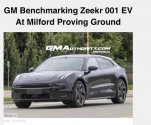Brazil to end import tax exemption for electric vehicles, says official
BRASILIA, Sept 15 (Reuters) - Brazil will end a tax exemption for importing electric vehicles, gradually raising the duty to 35% over three years, Industry Ministry official Uallace Moreira told Reuters on Friday.
Brazil-based carmakers lobbied for the measure, overcoming pushback from Chinese manufacturers who sell electric vehicles in the country. However, the final details are still being debated, and its timing will be decided by Industry Minister and Vice-President Geraldo Alckmin, Moreira said.
"What can we do to stimulate local production? Make imports a little more difficult or more expensive," Moreira said, arguing that several countries have adopted protectionist policies in this sector.
This week, the European Commission
into whether to impose punitive tariffs to protect European Union producers against cheaper Chinese electric vehicle imports it says are benefiting from state subsidies.
Moreira said the tariff will be implemented gradually, so as not to create a shock in the market, and will be in line with the government's plan to increase private investment in green technology.
He also said the government will issue a temporary measure within 15 days to launch the second phase of its "Rota 2030" program, aimed at increasing efficiency in the automotive sector, which will be renamed the "Green Mobility Program".
The new program will stimulate energy efficiency projects using tax credits, as well as create a mechanism that Moreira called "green taxation." The plan would stagger the collection of a tax on industrialized products, depending on the energy efficiency of the vehicle models, the recyclability of the products and local production density.


